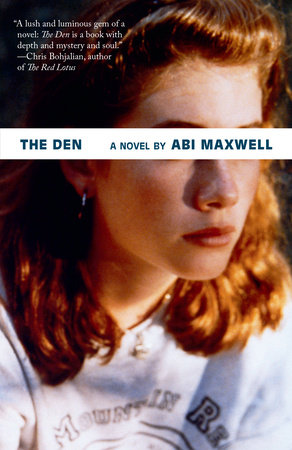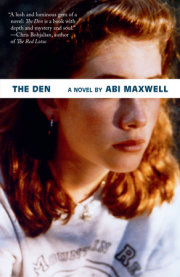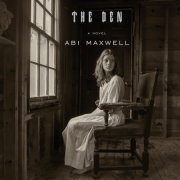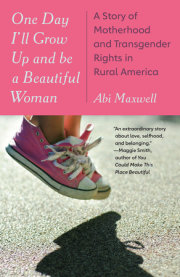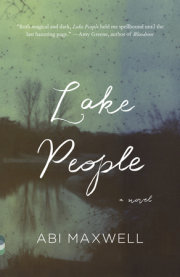1 Late June, an afternoon some twenty years ago. The fact that my sister could disappear not even a speck in my consciousness yet. The sun was high and shining, and Henrietta and I were just about to see Kaus, the one who started all of this, for the very first time. We had some money—I don’t know how, we weren’t babysitting yet—and because it was summer we had the time. Our father worked and our mother shut herself off in her studio on the third floor, so there was no one to stop us from going to the little store to buy candy. The owner kept a rack of smut right there in the open, and for this reason our father had prohibited us from entering, but no matter. This was the summer my sister had turned fifteen, started wearing an underwire bra, blow-drying her hair, and saying easily, “La, de, da,” to every command our parents gave.
Anyway, we didn’t look at the smut. Just bought our candy—loads of it—then walked on. I had thought we were headed home, but when we reached the abandoned mill my sister didn’t lead us back over the bridge but instead a little farther along. She strutted a few paces ahead of me as we went, and both of us stuffed our mouths. I can still remember the strange coating all that sugar gave my tongue.
Eventually we reached Church Street, which was not a street I had walked before. It ran along the river, and the far side of the road was crowded with a thick line of trailers. I knew I ought not to stare, but just the same I could not stop myself from taking in long, aching glances of life over there. We lived in an old farmhouse on a virtually empty road, so this hubbub seemed a dream. Women were out in their lawn chairs with cigarettes and portable phones and magazines; babies were in plastic pools; and everyone, from my view, was loud and happy. The sun was at our backs, and before us stood the trestle, which was yet another place we were not supposed to go. That abandoned railroad bridge rises roughly forty feet above the river, and it continues to be the spot where all the bad kids congregate to smoke and spit and jump into the water all summer long. The bridge’s iron trusses run beneath the tracks, and on that day with my sister their
X’s seemed to gleam like the most tantalizing of warnings. The reflection of the trees—pines, mostly, and maples—danced upon the water, and I wanted desperately to join with them in that cool, fresh place. And so I was shocked, and disappointed, when I looked ahead and saw that as Henrietta walked she let all her candy wrappers fall in her wake, then blow over the bank, toward the river.
“Litterbug,” I scolded her. She didn’t respond, so I repeated myself, and when she still didn’t respond I just kept at it. Not yelling, because I didn’t want to be heard by the neighborhood, but hissing. Loud enough, surely, for Henrietta to hear over the river. Still, she went right on ignoring me. I knew that if I really cared I could have just picked her trash up for her and dealt with the injustice of it later. But I was getting angry. We both had thin hair, mine mousy and nondescript and Henrietta’s, back then, a dark, shining brown that somehow hid the thinness. Her hair was long, too, so when I could bear her haughty strut no longer I reached forward and tugged. When my sister spun around that hair flew up and circled her pointed face and remained, a momentary defeat of gravity. I had a flash just then of my Henrietta transforming into a wild, yellow-eyed animal.
She didn’t say a word. Just grabbed my bare arm and pulled me toward her. She kept holding on to me, and her nails began to dig into my skin. I wanted to call out, but I understood this as her vicious command to shut up. We had come to a red two-story house that didn’t quite fit in. It wasn’t a trailer, there was that, but there was also something uncanny about the place. Where all other yards on the street were small and crowded with people, this one was oddly spacious and vacant. The curtains were drawn and the windows closed. I would have thought that the house itself was empty, had Henrietta not waited there so expectantly. But there we stood, together in the loudest of silences, until a teenage boy emerged from the house and stood on the front step, bathing in the sun’s rays.
Kaus. According to Henrietta, this was the first time she’d ever seen him, though she too must have been a liar.
Kaus. Over and over again I would repeat his name, just to feel its sounds emerge from the back of my throat and cross the length of my tongue.
Kaus—a soft, pillowed name, or a sharp and biting one?
He stood there gazing toward the river while we stood there gazing at him, and then he shifted and withdrew a cigarette from a pack in the pocket of his cutoff jean shorts with a motion so fluid it was preternatural. Despite the breeze that skimmed up off the river, he lit it the first time he tried, and then that boy walked our way. He didn’t speak to us, and we didn’t speak to him. Still, his intention was clear. Kaus cut across the street to walk right by Henrietta, and as he passed her he turned his head and blew a long, gentle stream of smoke her way. And my sister, she cocked her head and opened her thin lips and drew it right in.
We didn’t make it to the trestle that day; my sister just turned me around and led me back home. That night, when I took my bath, I saw that she had left five little welts on my upper arm. A sign, I later decided, of the beginning of the end.
Our house was half a mile up the hill from town. The way our parents told the story, they had gone for a drive through the countryside when they were young and in love, and had passed our house for the very first time. Or barn, really, because the barn was the thing. It was the largest in the entire county, and it was the whole reason we had ever ended up on this land in the first place. On that drive our father had pulled over and walked right onto the property without worrying over whether or not anyone lived there (no one did), and he ran his hands over the barn’s shingles as though they were the skin of a lover.
Hand-hewn beams, he said when he slid open the door, and,
Christ! That one sill extends nearly seventy feet!
Our mother, once brave enough, tiptoed to the house and peered in the windows. “That godforsaken wallpaper,” she would say when our father told the story. At the time, Henrietta was in her belly, taking hold of life, though my mother didn’t know it yet. They went home to their apartment in the little city to the south, and our father lay on their mattress on the floor and dreamed aloud, and our mother, because she just wanted sleep, said something like, “For Christ’s sake, Charley, then do it,” without thinking he ever would. A week later they owned the place—the down payment made with the bit of inheritance they had received from our father’s parents. The floors were dirt and the stairs, our mother claimed, were planks weaker than her own hands, but it was cheap and, as our father said, it was theirs.
By the time Henrietta and I came along, there were barn cats and chickens, and once in a while two pigs or a meat cow, and always there were Shania and Dolly, those strong black mares with coats and gallops sleek as oil. Our father claimed he’d had those mares forever.
Our father did not make much money—he was a cook, and eventually the head cook at the hospital—but with that house and barn he had his dream, and I suppose that is why he seemed compelled to sacrifice all else in order to give our mother her dream, too. He supported her choice to stay at home while we went to school, despite the fact that in addition to working it was also he who cooked, cleaned, and performed nearly all other household tasks.
But our mother was an artist—a painter, though she rarely ever sold a piece—and a woman who, I am sure, never fully wanted children. This fact kept her at a remove, and at night, when dinner was through and the dishes were done, she would open the family heirloom box of real silver, remove the velvet caddy that held the dinnerware, and reach into the bottom, beneath the velvet sheath of grapefruit spoons. There she would find one of her thin joints. She would swipe a wooden match across the top of the woodstove, take a few puffs, and then our mother would transform into a woman so distant, and so fully within herself, that Henrietta and I—spying from the top of the staircase—would be stunned and overcome with a disconcerting mix of desperation to be seen by her and to disappear and become her.
“Sylvia,” our father would sometimes say, and each time I heard that—her first name—a little swell of fear would rise up in me.
Sylvia, a name so singular, so volatile. Not our mother but a woman who, at any moment, could leave this little life of ours.
Henrietta, though, the fact that she—her whole self, spirit and body and all—could leave our life, that had never occurred to me, not yet. I was twelve years old that summer of Kaus and always told my sister everything I had to tell. I would have told her anything at all. And I knew my sister, through and through I did. She had perpetually tanned skin and short toes. Her thumbs arched gloriously backward, and she was double-jointed in her fingers, so that she could bend the top portion of each finger downward while keeping the rest of it perfectly straight. At night she stuck her chewed gum to her headboard, and she could sniff a thin rope up through her left nostril and pull it out through her right one. She could do a backbend and three perfect cartwheels in a row and even a front handspring. She dreamed about boys, not “smut dreams,” as she called them, but just peaceful little dreams in which she and a boy would drift along in a rowboat or walk hand in hand. She also dreamed about riding horses, and in nightmares she dreamed that a giant wave crashed over her. But that summer, after I saw that boy, I had the strange sensation of beginning to realize something that I had always known. My sister—there was a layer to her, invisible but palpable as her skin itself, that would not ever be opened to me.
The day after I saw him for the very first time, my sister dragged me along with her to town once again. Typically I would have gone without hesitation, but on that day I’d happened to be immersed in a new book:
Flowers in the Attic by V. C. Andrews. Reading, I’d understood even back then, was my particular gift. The one thing I could invariably do better than my brave sister. I was fast, but there was also a deep, peculiar understanding I received by letting my eyes rest hazily upon a page. I turned pages virtually by the second, and just as I had a strange sense that my mother would flee, I also felt this gift would, and so each night I stowed my book beneath my pillow, where no one could get at it. I read undiscerningly—mysteries, romances, horrors, anything. I felt it my duty in life. But uncharacteristically, my father had taken note of that particular book and said I could not read it, that it was beyond my age. My mother had heard him and said, “Jesus, Charley,” and that had been that—I had kept on. I’d stayed up half the night with that book, feeling that I’d better finish it before my parents came to their senses and tore it from my hands. I wasn’t finished when Henrietta showed up at my door to drag me into town, and I would have just as soon kept on reading. But Henrietta told me to go with her, and so I went.
She vomited before we left the house. This, of course, was early in the mess, so I hadn’t quite caught on yet—maybe I didn’t want to. I said, “Don’t you want to lie down?” or something of that nature, and then, eventually, when she shuffled me out the front door, “Well, I better not catch it.”
“Can’t catch hotness, sister,” she said, and tossed her hair back.
I followed her as she strutted down the center of our road like she owned it, her newfound maturity made even more brazen overnight. When a car rolled toward us, Henrietta didn’t even move out of the way. It was Mr. Cutler, our only neighbor, whose house lay up the hill, just barely out of sight. We had always known him, at least vaguely, but he was a strange, overeager man whom we did our best to avoid. He must have been in his fifties, yet despite his age, when he caught us on the road he would always ask us what was new and cool. “Are these jeans cool?” he would say. “What music are the kids listening to these days, anyway?”
Today he leaned out the window of his yellow sports car and said to Henrietta, “You have yourself a boyfriend yet?” The question alone surprised me, but when she responded simply that she did, my jaw dropped.
Mr. Cutler let a smile spread over his clean-shaven face, and then he eased his car down the hill and out of sight. My sister continued walking. I scurried after her, calling, “That boy’s your boyfriend?” and, “The one from the red house?” and, “How do you know he’s your boyfriend?” plus a handful more varieties of the same question, none of which she would answer. She just waltzed ahead of me while I followed like a dog, over the bridge and into town.
I never did figure out what exactly made Henrietta go to that little store on a daily basis in the early days of that summer. On that first day after Kaus, though, rather than going straight in as we always had, my sister just leaned against the building and bent one leg up so that her foot rested flatly against the brick. She tilted her head back, very exhausted, very adult, and she said, “God, I could kill for a cigarette.”
I don’t know that I said anything to that. I don’t know that I could overcome my shock in order to do so.
She said, “God, what?” and, “Don’t look at me like that,” and then, as insurance against my tattling, she marched right into that store and spent five whole dollars on five hundred Sour Patch Kids for me.
Copyright © 2019 by Abi Maxwell. All rights reserved. No part of this excerpt may be reproduced or reprinted without permission in writing from the publisher.

